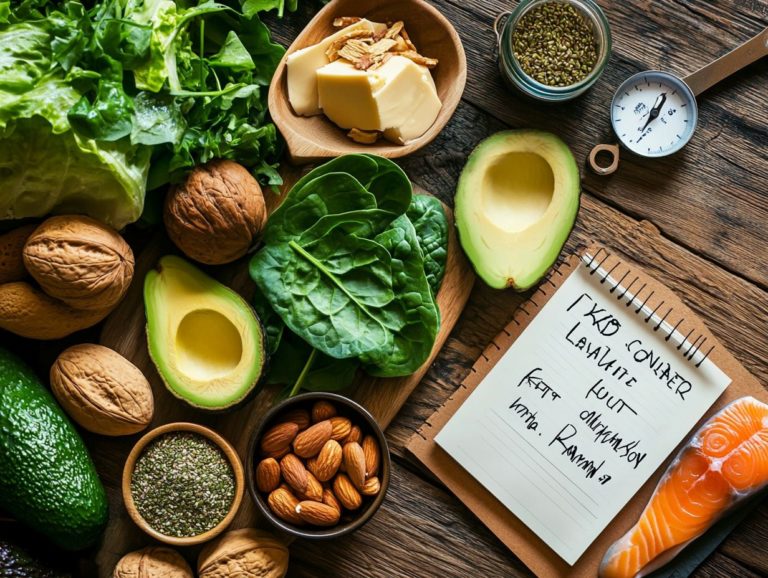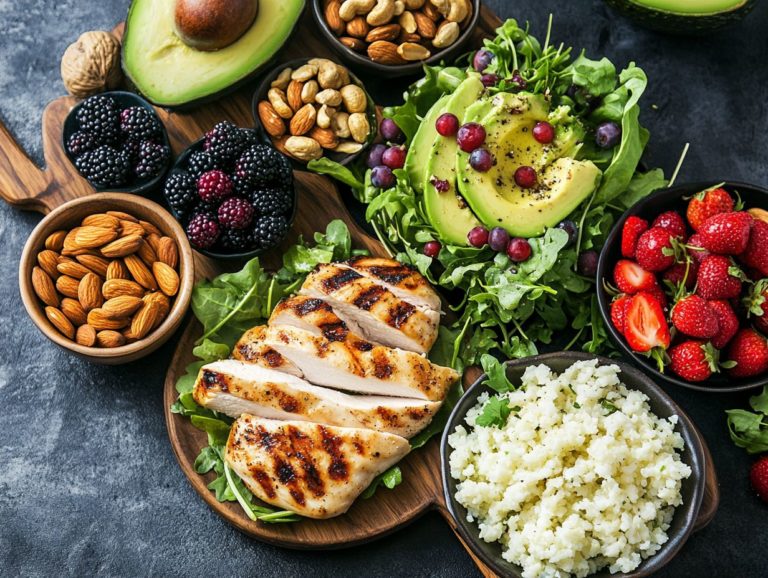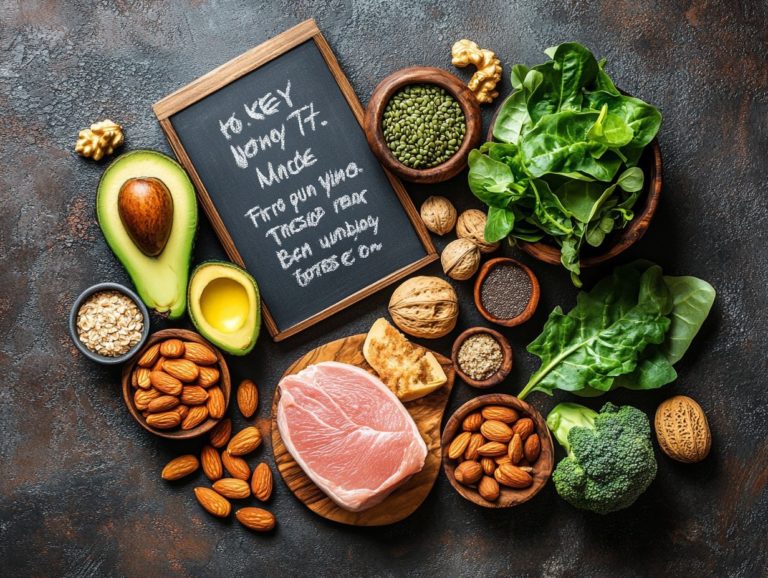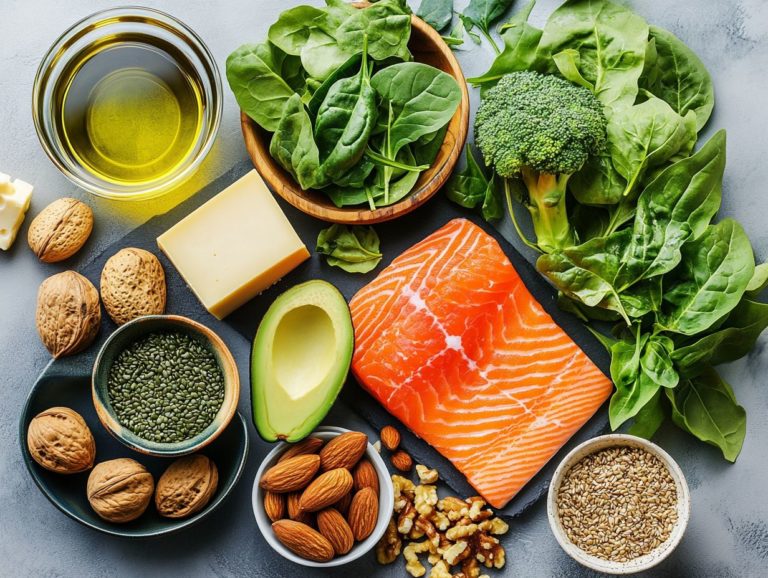Keto Diet: Nutritional Challenges and Solutions
The Keto diet has surged in popularity, celebrated for its potential to facilitate weight loss and enhance overall health. However, while it presents remarkable benefits, it also introduces distinct nutritional challenges that could affect your well-being, especially in the context of dietary restrictions and specific health parameters.
You may encounter issues ranging from fiber deficiencies to concerns regarding cholesterol and fat intake, making it essential to navigate the Keto landscape with thoughtful consideration.
This article will delve into the mechanics of the Keto diet, the nutritional obstacles you may face, including potential health complications, and practical strategies to surmount them, ensuring you can reap the benefits without sacrificing your health.
Contents
- Key Takeaways
- What is the Keto Diet?
- What are the Nutritional Challenges of the Keto Diet?
- How Can These Challenges Be Addressed?
- Essential Components of a Keto Diet
- What Are Some Tips for a Balanced Keto Diet?
- Your Keto Questions Answered!
- 5. Consult with a Healthcare Professional
- What is a Keto Diet and what are some common nutritional challenges associated with it?
- Can a Keto Diet lead to nutrient deficiencies?
- How can I ensure I am getting enough fiber on a Keto Diet?
- What are some good sources of electrolytes on a Keto Diet?
- Are there any potential risks associated with a Keto Diet?
- Want to conquer your Keto nutritional challenges? Here are some solutions!
Key Takeaways

- Keto diets can lack fiber, vitamins, and minerals, leading to digestive issues and nutrient deficiencies.
- Incorporating fiber-rich foods, supplements, and choosing healthy fats can help address these challenges.
- A balanced keto diet should focus on whole foods, a variety of vegetables, and monitoring intake. Consult a healthcare professional for tailored advice.
What is the Keto Diet?
The ketogenic diet, commonly known as the keto diet, is a low-carbohydrate eating plan that invites you to indulge in high-fat foods while significantly cutting back on carbohydrates. This dietary approach aims to induce a metabolic state known as ketosis, where your body becomes a lean, mean fat-burning machine, relying on fat for energy rather than glucose.
This nutritional strategy has garnered attention for its impressive health benefits, particularly in weight loss and managing insulin resistance. It’s especially relevant for individuals dealing with medical conditions like diabetes, epilepsy, Alzheimer s disease, and even cancer.
Therefore, grasping the framework of the ketogenic diet and its dietary guidelines is crucial for anyone contemplating this transformative lifestyle.
How Does the Keto Diet Work?
The keto diet operates by shifting your body into a state called ketosis, where you transition your primary energy source from carbohydrates to fats. This shift leads to important changes in how your body works.
As you drastically reduce your carbohydrate intake, you’ll notice your insulin levels dropping considerably. Insulin, that vital hormone responsible for regulating blood sugar, also plays a key role in fat storage. With lower insulin levels, your body kicks off a process called lipolysis, breaking down stored fat into fatty acids and glycerol. These fatty acids are then converted into ketone bodies, which become an alternative fuel source for various organs, including your brain.
This metabolic shift influences appetite-regulating hormones like ghrelin and leptin, often leading to diminished feelings of hunger and reducing food cravings. As a result, your body becomes more adept at utilizing fat, facilitating weight loss and enhancing your energy levels.
What are the Nutritional Challenges of the Keto Diet?
While the ketogenic diet can provide a wealth of health benefits, it also presents several nutritional challenges to consider before fully committing to this dietary approach. These challenges often stem from strict carbohydrate limits, which may lead to potential health risks, including nutrient deficiencies in essential vitamins and minerals crucial for your overall well-being.
Stay alert to the potential health complications that may emerge, particularly if you have pre-existing medical conditions or if you’re not following balanced dietary guidelines. Consider consulting a registered dietitian for personalized guidance and support on your journey!
1. Lack of Fiber
One of the notable challenges you may encounter with the ketogenic diet is the deficiency of dietary fiber. Fiber is primarily found in carbohydrates and is essential for maintaining digestive health and overall nutritional balance.
This lack of fiber can lead to a range of health complications. These include constipation, poor gut health, and an imbalance in your gut microbiota, which is the community of bacteria in your digestive system. You might also experience bloating and discomfort, significantly affecting your overall well-being and energy levels. It’s important to tackle these issues to stick to your diet and stay healthy.
To address these concerns while adhering to a keto lifestyle, consider incorporating fiber-rich, low-carb vegetables like leafy greens, avocados, and flaxseeds into your meals. Exploring fiber supplements or introducing sources of soluble fiber can further enhance your digestion and restore balance within your digestive system. This way, you can maintain your health while successfully navigating your dietary goals.
2. Vitamin and Mineral Deficiencies
A ketogenic diet might lead to vitamin and mineral deficiencies if you’re not careful. This is primarily due to the limited variety of food groups you consume, especially when you cut out many fruits and whole grains. Understanding these dietary restrictions and their long-term effects on health is essential.
This restriction can significantly affect your intake of essential nutrients like vitamin C, magnesium, potassium, and fiber. Vitamin C is vital for maintaining immune function and promoting skin health, while magnesium is important for muscle function and energy production. Without adequate potassium, you may experience muscle cramps and fatigue.
Being aware of these potential dietary deficiencies is crucial. Don’t let these deficiencies sneak up on you; they can seriously affect your health! Consulting with a registered dietitian can offer personalized dietary strategies to help.
3. Potential for High Cholesterol and Saturated Fat Intake
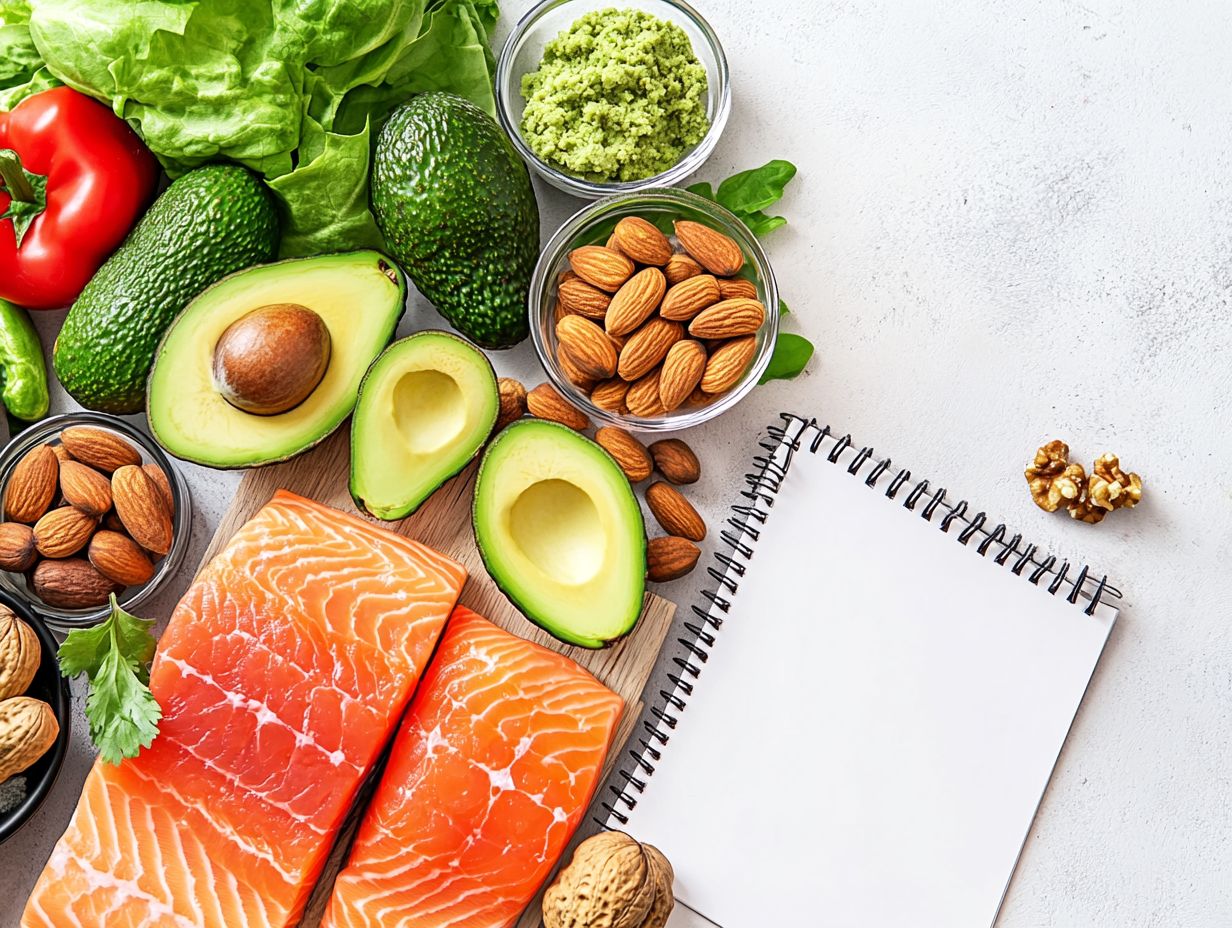
The ketogenic diet s emphasis on high-fat foods raises concerns about potential increases in cholesterol and saturated fat intake, which can pose health risks for some individuals, particularly regarding heart health.
This focus on fat can influence your cholesterol levels, especially the balance between HDL (high-density lipoprotein) and LDL (low-density lipoprotein) cholesterol. As you embrace this diet, you might find your HDL levels rising often dubbed the good cholesterol. This is a positive development for heart health, as it helps clear other forms of cholesterol from your bloodstream.
However, it s equally vital to monitor your LDL levels. Elevated amounts can heighten the risk of cardiovascular diseases. Evaluating how your ketogenic dietary choices impact both types of cholesterol is essential. Understanding this balance can offer valuable insights into your overall heart health and guide you toward appropriate dietary adjustments if you re at risk.
How Can These Challenges Be Addressed?
To effectively navigate the challenges posed by the ketogenic diet, you can implement a range of dietary strategies that not only address potential nutritional deficiencies but also help you sustain the health benefits that come with this low-carbohydrate lifestyle. Strategies may include practicing fasting periods and ensuring balanced caloric intake.
Essential Components of a Keto Diet
1. Incorporating Fiber-rich Foods
Incorporating fiber-rich foods into your ketogenic diet is important for good digestive health and can effectively mitigate the drawbacks of low carbohydrate intake. These foods support gut health and play a crucial role in regulating your blood sugar levels while promoting a lasting sense of fullness.
Consider leafy greens such as spinach and kale. They are low in carbohydrates yet packed with vital nutrients and fiber, making them excellent choices for your meals. These foods help maintain glucose levels and energy production.
You can also enhance your diet by adding a variety of nuts and seeds. Options like chia seeds or almonds provide healthy fats along with fiber. These components work together to boost your metabolism, assist with weight management, and support your overall well-being.
By choosing these fiber-rich foods, you ensure stability on your ketogenic journey, allowing you to fully experience the benefits this diet has to offer.
2. Supplementation
Supplementation can be a highly effective strategy for addressing nutrient deficiencies that might arise while you’re on a ketogenic diet, especially regarding essential vitamins and minerals that could be lacking due to limited food groups.
The restrictive nature of this high-fat, low-carb diet may leave you needing critical nutrients vital for your overall health. Among the most advantageous supplements for a keto regimen are magnesium, potassium, and omega-3 fatty acids. These supplements support energy production and overall health outcomes.
- Magnesium is essential for maintaining muscle and nerve function, promoting restful sleep, and aiding in energy production.
- Potassium plays a crucial role in balancing electrolytes, which can easily become disrupted during ketosis. Omega-3 fatty acids support heart health and reduce inflammation.
By thoughtfully incorporating these specific supplements into your routine, you can achieve a better nutritional balance and foster positive health outcomes. Act now to boost your nutritional balance and enhance your keto experience!
3. Choosing Healthy Fats
Choosing healthy fats is vital to your success on the keto diet, as it directly influences your cholesterol levels and overall health outcomes.
Incorporating sources of these beneficial fats can significantly enhance your meal satisfaction and nutritional intake. For example, avocados offer a fantastic source of monounsaturated fats, along with a delightful boost of fiber, potassium, and essential vitamins.
Another excellent option is olive oil, renowned for its heart-healthy properties and rich antioxidants. It s perfect for drizzling over salads or incorporating into your cooking. Fatty fish, like salmon and mackerel, are not just about omega-3 fatty acids; they also deliver a generous amount of protein and offer anti-inflammatory effects.
By meticulously selecting these nutrient-dense fats, you can maintain your energy levels while supporting your overall well-being on your keto journey.
What Are Some Tips for a Balanced Keto Diet?
Maintaining a balanced keto diet demands your thoughtful attention to food choices and overall dietary patterns. It’s essential to ensure that your selections not only meet your nutritional needs but also facilitate weight loss and promote other health benefits.
1. Focus on Whole, Unprocessed Foods

Focusing on whole, unprocessed foods is essential for you as you strive to achieve a balanced ketogenic diet, as these foods are typically richer in nutrients and healthier fats.
These nutrient-dense options not only provide a superior array of vitamins, minerals, and antioxidants but also play a crucial role in maintaining your optimal health and supporting metabolic functions.
By choosing whole foods like leafy greens, avocados, nuts, and fatty fish, you can ensure that your body receives the right balance of macronutrients without the added sugars and harmful chemicals often present in processed alternatives.
The benefits extend far beyond weight management. By prioritizing whole foods in your diet, you’ll likely notice improvements in your energy levels, enhanced mental clarity, and an overall boost in well-being.
2. Include a Variety of Vegetables
Incorporating a variety of low-carb vegetables into your ketogenic diet is essential for ensuring you receive the vital vitamins, minerals, and fiber that might otherwise be missing from your meals.
These vegetables boost your health and make your meals more exciting on a keto plan. Consider cruciferous options like broccoli and cauliflower, which are fantastic sources of vitamin C and K.
Leafy greens such as spinach and kale deliver a generous dose of iron and antioxidants. Don’t overlook mushrooms and bell peppers, either; they bring unique flavors and textures that can make your keto meals far more delightful.
By adding these nutrient-dense vegetables to your diet, you can stick to your meal plans more easily, ensuring a well-rounded intake of essential nutrients while keeping your carbohydrate consumption in check.
3. Monitor Intake of Protein and Fat
Monitoring your protein and fat intake is essential on a ketogenic diet to maintain a proper balance that meets your body’s needs without going overboard on calories.
This balance is crucial not only for sustaining your energy levels but also for your overall health and well-being.
Adequate protein intake bolsters muscle maintenance and recovery, while healthy fats supply the essential fatty acids that are vital for hormone production and cellular function.
If you’re following a keto regimen, aiming for a ratio of approximately 70-75% fats, 20-25% protein, and 5-10% carbohydrates is generally recommended. Macronutrients are the nutrients your body needs in large amounts, namely fats, proteins, and carbohydrates.
Keeping track of these macronutrients can help you maximize ketone production and ensure you re getting sufficient nutrients while staying aligned with your goals.
Remember, personal factors like your activity level and metabolic health can influence these ratios, so you may need to fine-tune your intake for optimal performance.
4. Stay Hydrated
Staying hydrated is essential on a ketogenic diet, as increasing your water intake can effectively manage the metabolic changes and potential side effects that come with this dietary approach.
Drinking enough fluids helps combat fatigue and headaches often experienced during the transition to ketosis, but it also plays a crucial role in optimizing your body s overall performance.
Given that the ketogenic diet focuses on low carbohydrates, it can lead to a loss of electrolytes, making it vital for you to drink plenty of water and consider adding electrolytes like sodium, potassium, and magnesium to your regimen.
To maintain proper hydration, you might want to include hydrating foods such as cucumbers and watermelon in your meals, and setting regular reminders throughout the day to drink water can be a game-changer.
By emphasizing hydration, you’ll significantly enhance your energy levels, metabolism, and overall wellness on your keto journey.
Your Keto Questions Answered!
5. Consult with a Healthcare Professional
As you embark on a ketogenic diet, consulting with a healthcare professional or a registered dietitian can be a game changer. They provide invaluable support, ensuring you adhere to dietary guidelines tailored to your specific health needs.
Professional guidance provides personalized advice that aligns perfectly with your unique health conditions. It also establishes a vital monitoring system to watch for any potential complications during your dietary transition. Engaging with a specialist minimizes the risks associated with a lack of nutrients and metabolic fluctuations, while offering ongoing encouragement and accountability.
Experts are your allies in crafting delicious meal plans that maximize your nutrient intake, providing practical strategies that make the keto lifestyle a sustainable way of living. With the assistance of qualified professionals, you can navigate your ketogenic journey confidently, significantly boosting your chances of long-term success.
What is a Keto Diet and what are some common nutritional challenges associated with it?
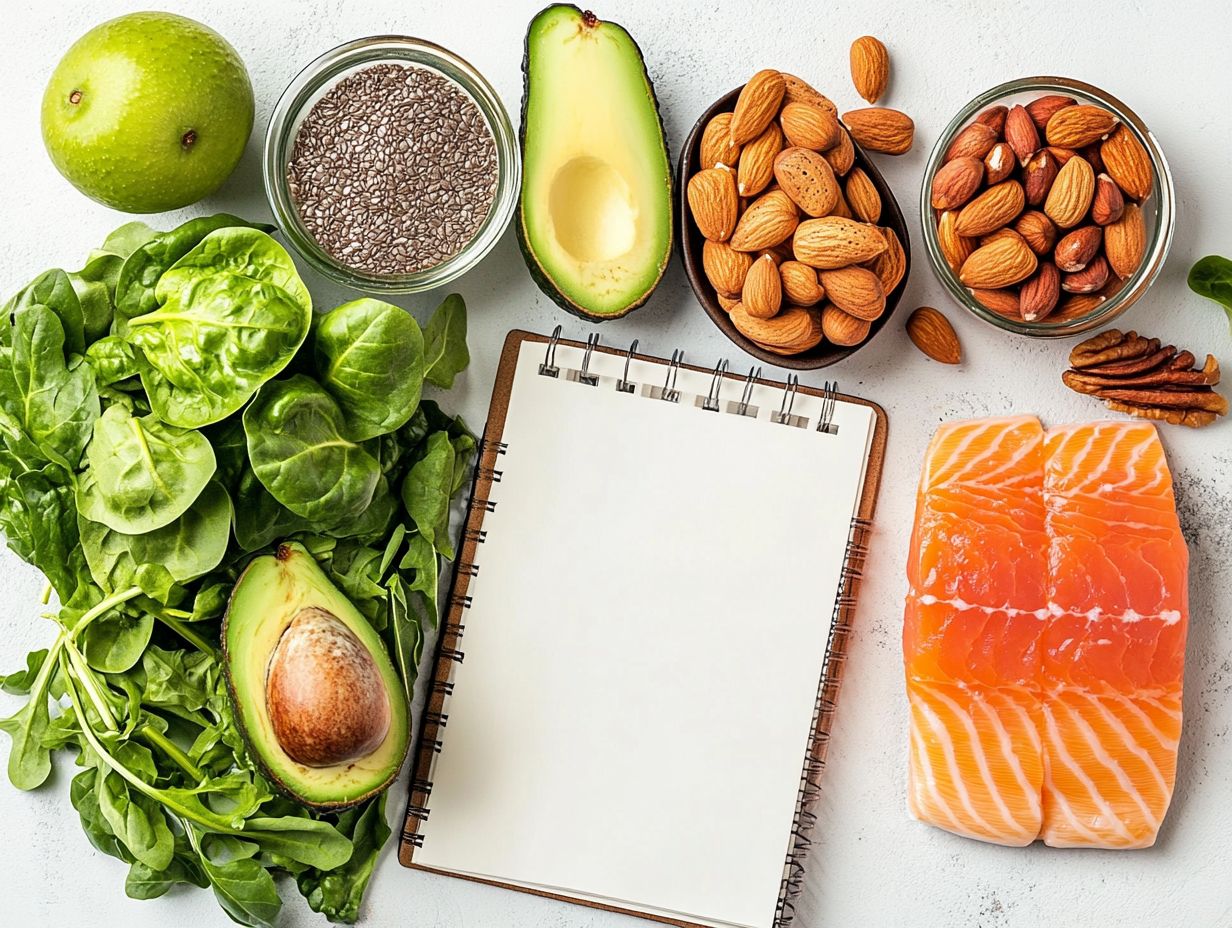
A Keto Diet is a low-carbohydrate, high-fat diet that encourages the body to burn fat for energy instead of glucose. Common nutritional challenges include getting enough fiber, electrolytes (minerals that help with bodily functions), and essential vitamins and minerals.
Can a Keto Diet lead to nutrient deficiencies?
Yes, a Keto Diet can potentially lead to a lack of nutrients if not planned properly. This diet restricts certain food groups, such as fruits and whole grains, which are important sources of vitamins and minerals.
How can I ensure I am getting enough fiber on a Keto Diet?
To ensure sufficient fiber intake, incorporate low-carbohydrate vegetables such as broccoli, cauliflower, and leafy greens into your meals. You can also supplement with high-fiber foods like chia seeds and psyllium husk.
What are some good sources of electrolytes on a Keto Diet?
Electrolytes, including sodium, potassium, and magnesium, are crucial for proper bodily function. Good sources of electrolytes on a Keto Diet include:
- Avocados
- Leafy greens
- Nuts and seeds
- Electrolyte-enriched drinks
Are there any potential risks associated with a Keto Diet?
Yes, a Keto Diet may not be suitable for everyone and can pose risks if not followed correctly. Possible risks include nutrient deficiencies, keto flu symptoms, and an increased risk of heart disease in some individuals.
Want to conquer your Keto nutritional challenges? Here are some solutions!
To overcome nutritional challenges on a Keto Diet:
- Plan meals carefully
- Incorporate a variety of low-carbohydrate vegetables
- Supplement with essential vitamins and minerals if needed
It is also recommended to consult with a healthcare professional before starting this diet.

